| 1. | FTIR- Fourier Transformed Infra-Red Spectroscopy
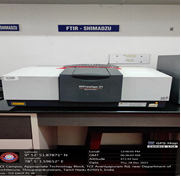 | FTIR Prestige-21 with ATR: - Spectral Range: 7800-350 cm-1
- Spectral Resolution: 0.5-4 cm-1
- Detector: DLATGS (Deuterated L-Alanine-doped Triglycine Sulphate)
- ATR (Attenuated Total Reflection) Accessory: Single reflection diamond ATR
- Scan Speed: Up to 20 scans/sec
- Data Acquisition: Automatic
- Sampling: Solid, liquid, and gas samples
| - The FTIR instrument is a powerful analytical tool used to identify and quantify the molecular composition of materials.
- This allows for the identification of functional groups, molecular structures, and contaminants in a wide range of samples, including plastics, polymers, and other organic materials.
| Our laboratory offers testing services using FTIR Prestige-21, providing: - Identification and characterization of materials
- Quantitative and qualitative analysis of chemical composition
- Detection of contaminants and impurities
- Analysis of polymers, pharmaceuticals, food, and environmental samples`
| Dr A. Ramalinga Chandra sekar
Contact No. –9894532757,
email: arcchem@tce.edu |
| 2. | Differential Scanning Calorimeter
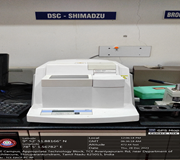 | DSC 60: - Temperature Range: -140°C to 600°C
- Heating/Cooling Rate: 0.1°C/min to 100°C/min
- Sensitivity: 0.1 μW
- Sampling: Solid, liquid, and gas samples
- Atmosphere: Nitrogen, helium, or air
- Data Acquisition: Automatic
| - The DSC instrument is a thermal analysis technique that measures the heat flow into or out of a sample as it is heated or cooled.
- The DSC instrument provides valuable information on the thermal properties of materials, including melting points, glass transition temperatures, and heat capacity.
| Our laboratory offers testing services using DSC-60, providing: - Thermal property analysis of materials
- Determination of melting points, glass transition temperatures, and heat capacity
- Study of thermal transitions, such as crystallization, degradation, and oxidation
- Analysis of polymers, pharmaceuticals, foods, and other materials
| Dr A. Ramalinga Chandra sekar
Contact No. –9894532757,
email: arcchem@tce.edu |
| 3. | Brook Field Viscometer
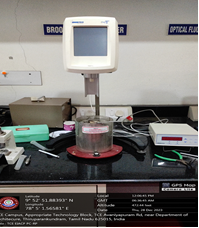 | Brookfield Viscometer DV II+T with Thermosel: - Measurement Range: 1-2,000,000 cP (mPa·s)
- Accuracy: ±1% of full-scale range
- Repeatability: ±0.2% of full-scale range
- Temperature Range: 20°C to 250°C
- Spindle Speed: 0.3-100 rpm
| - The Brookfield Viscometer DV II is a digital viscometer used to measure the viscosity of liquids and semi-solids.
- The instrument is suitable for a wide range of applications, including quality control, research and development, and process optimization, in industries such as pharmaceuticals, cosmetics, food, and chemicals.
| Our laboratory offers testing services using Brookfield Viscometer DV II+T, providing: - Viscosity measurements of liquids and semi-solids
- Determination of flow behaviour and rheological properties
- Evaluation of material properties under various temperatures and shear rates
- Quality control and quality assurance testing
- Research and development testing
| Dr A. Ramalinga Chandra sekar
Contact No. –9894532757,
email: arcchem@tce.edu |
| 4. | Compression Testing Machine
 | Compression Testing Machine (CTM): - Capacity: 3000 KN (300 ton)
- Test Speed: 0.5-50 mm/min
- Accuracy: ±1% of indicated load
- Resolution: 0.01 KN (0.01 ton)
| - The Compression Testing Machine is a laboratory testing instrument used to measure the compressive strength and properties of various materials, such as concrete, cement, plastics, and composites.
| Our laboratory offers testing services using Compression Testing Machine (CTM), providing: - Compressive strength testing of concrete, cement, and other construction materials
- Evaluation of material properties, including compressive strength, modulus, and deformation
- Research and development testing
| Dr A. Ramalinga Chandra sekar
Contact No. –9894532757,
email: arcchem@tce.edu |
| 5. | Optical Fluorescence Microscope
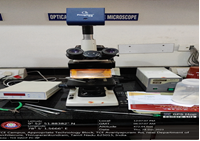 | - Microscope Type: Inverted or Upright Fluorescence Microscope
- Objective Lenses: 4x, 10x, 20x, 40x, 63x, 100x
- Fluorescence Illumination: High-intensity LED or Mercury lamp
- Excitation Filters: 365nm, 405nm, 488nm, 555nm
- Emission Filters: 420nm, 520nm, 590nm, 670nm
- Camera: High-sensitivity CCD or CMOS camera
- Image Resolution: Up to 2048x2048 pixels
| - The Optical Fluorescence Microscope instrument is a powerful tool for materials characterization, allowing researchers to visualize and analyse the microstructure and properties of materials at the nanoscale.
| Our laboratory offers testing services using Optical Fluorescence Microscopy, providing: - High-resolution imaging of fluorescently labelled samples
- Visualization of cellular structures and proteins
- Analysis of material properties and defects
- Detection of biomarkers and pathogens
| Dr A. Ramalinga Chandra sekar
Contact No. –9894532757,
email: arcchem@tce.edu |
| 6. | Marshal Stability Value Apparatus
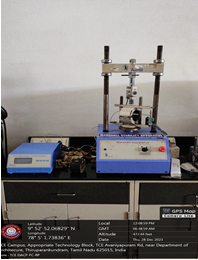 | Marshal Stability Value Instrument (AIMIL): - Model: AIMIL-MSV-1000
- Loading Capacity: 0-10,000 lb (0-44.5 kN)
- Deformation Rate: 0.5-5.0 mm/min
- Load Cell Accuracy: ±0.5% of full scale
- Deformation Measurement Accuracy: ±0.01 mm
- Sample size: 102 mm diameter x 63.5 mm height
| - The Marshal Stability Value instrument is a testing device used to determine the Marshal Stability Value of compacted asphalt mixtures.
- The instrument provides accurate and reliable results, and is widely used in the construction and transportation industries for the design and evaluation of asphalt mixtures.
| Our laboratory offers testing services using the Marshal Stability Value instrument (AIMIL), providing: - Determination of Marshal Stability Value (MSV) of bituminous mixtures
- Measurement of flow value and deformation of bituminous mixtures
- Evaluation of bituminous mixture's resistance to deformation and flow
| Dr A. Ramalinga Chandra sekar
Contact No. –9894532757,
email: arcchem@tce.edu |
| 7 | Scanning Electron Microscopy
 | TESCAN-VEGA-3-Scanning Electron Microscope - Materials technology lab Department of Chemistry. | Scanning electron microscope (SEM) is a type of electron microscope and produces images of solid samples by scanning the surface with a focussed beam of electrons. | - SEM is used to examine the surface of a sample at a higher resolution
- Evaluation of particle size, shape, porosity, grain size and grain boundary
| Dr M Velayudham
Contact No. – 9842378423, email:mvchem@tce.edu |
| 8 | Electrochemical work station
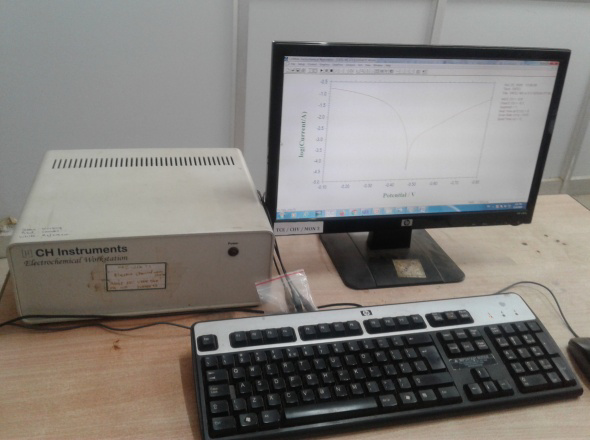 | CH-Instruments– Electrochemical workstation- Dept.of Chemistry Lab | Electrochemical workstation is a sophisticated instrument used to measure and control electrical signals in electrochemical experiments. | - Electrochemical workstation is an important instrument to test corrosion of metal and alloys by Electrochemical Impedance, TAFAL Polarisation.
- In addition to this, Electrochemical oxidation/reduction- Cyclic Battery charge-discharge, chronopotentiometry. voltametry, Differential pulse voltammetry can also be tested.
| Dr V Velkannan,
Contact No. – 9840839171,
email: velkannan@tce.edu |
| 9 | Solar stimulator
 | Solar Simulator with I-V Measurement System – Indigenously Made. Research Lab, Dept. of Chemistry lab | Solar stimulator is a light source and mimics natural sunlight. It is used to create a controllable indoor test environment. | - Solar simulators are used to test Current – Voltage
- characteristics of Solar Cells, Solar thermal and concentrating optics.
| Dr R Siva Kumar
Contact No. 9940743702
Email id: rsrchem@tce.edu |
| 10 | Spin coater
 | Spin Coater Chemistry - Research Lab, Department of Chemistry - Indigenously Made | Spin coater is a device used to deposit thin uniform films on flat surface | - Deposition of thin films for optical studies, corrosion protection, etc.
- Coating of thin films and polymer films
| Dr M. Kottaisamy
Contact No. –94894804140, email:hodchem@tce.edu |
| 11 | Optical Fluorescence Microscope
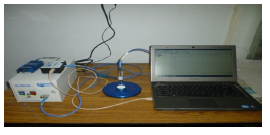 | Ocean optics – 2000, spectrophotometer Measurement wavelength range from 220 nm to 850 nms. Dept.of Chemistry Lab - Lamp Source: D2 and Tungsten lamp for both UV and visible light regions
| Ocean Optics - UV-Visible miniature spectrophotometer is used to measure the electromagnetic radiation from 220 nm – 850nm and provide datas with high spectral resolutions | - Ocean optics spectrophotometer is used to measure the transmittance, absorbance, reflectance of thin films, powder samples.
- It is also used to test the band gap of semi conducting, organic/ inorganic materials,
- It is used to test luminescent materials and white LEDs and their luminescent emission color co-ordinates.
| Dr M. Kottaisamy
Contact No. –94894804140, email:hodchem@tce.edu |











